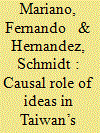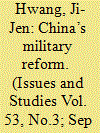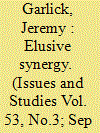|
|
|
Sort Order |
|
|
|
Items / Page
|
|
|
|
|
|
|
| Srl | Item |
| 1 |
ID:
158044


|
|
|
|
|
| Summary/Abstract |
While embracing trade policies that foster trade liberalization, Taiwan has clear protectionist policies covering its agricultural trade, which combine border measures with domestic support, and are closely modeled on the policies created by the European Union. The idea of multifunctionality of agriculture — and its link to trade policy — has created a normative framework whereby the agricultural markets have to be shielded in order for them to provide non-commodity attributes or public goods. This paper aims to explore the causal power of ideas (liberalization and multifunctionality) in the definition of Taiwan’s agricultural trade policy, by analyzing them from the perspective of historical institutionalism, and taking Taiwan as a case study. It is the institutionalization of the idea of multifunctionality that gives it an explanatory power toward understanding the ideational source of protectionism in agricultural trade.
|
|
|
|
|
|
|
|
|
|
|
|
|
|
|
|
| 2 |
ID:
158043


|
|
|
|
|
| Summary/Abstract |
In late 2015, the Chinese leadership announced sweeping reforms designed to bring the military into the modern era, signaling a departure from a traditional over-dependence on ground forces and incorporating extensive structural reorganization to create a more balanced joint command system. The reform aims to create a system suited to the modern conditions of informatization, with direct leadership from the Central Military Commission, and is bolstered by the Chinese military’s advancement in progressive information technology, space technology, and cyber security. With the creation of a new Strategic Support Force (SSF), China has clearly demarcated the operational command of traditional and non-traditional warfare within the military system, representing a strategic and tactical step forward that gives greater scope to the People’s Liberation Army (PLA) to dominate in non-traditional military theaters. While the military reform has the potential to affect military strategy around Asia and further afield, the extent of China’s deep and far-reaching military reform, with a view to consolidating military capabilities under a joint command and giving full rein to non-traditional warfare under conditions of informatization, represents a particularly significant factor in the stability of cross-strait relations and security. This study will outline the creation of the SSF under the new reform, and discuss the development of China’s strategy and tactics for non-traditional warfare under conditions of informatization. The implications of the military reform will then be put into the cross-strait context, in order to draw conclusions concerning the potential impact on cross-strait security.
|
|
|
|
|
|
|
|
|
|
|
|
|
|
|
|
| 3 |
ID:
158042


|
|
|
|
|
| Summary/Abstract |
In 2012, China and the European Union (EU) issued a joint declaration on energy security. It is unclear, however, what progress has been made since then in terms of applying the goals of the declaration. This paper sets out to assess the present state of China and the EU’s energy security, the potential for future cooperation, and the obstacles which stand in the way. The analysis assesses the extent to which the two actors can work together on improving energy infrastructure, diversifying supplies, and developing renewable and nuclear energy, possibly by finding synergies between China’s Belt and Road Initiative and the EU’s Juncker Plan. It also includes a re-examination of the concept of energy security to take account of the urgency of addressing the collapse of the global environment. Overall, the analysis suggests that although due to geographical and other constraints there may be limited opportunity for cooperation between the EU and China on securing oil and gas supplies, there are both scope and a pressing need for joint action in the field of renewable energy.
|
|
|
|
|
|
|
|
|
|
|
|
|
|
|
|
| 4 |
ID:
158041


|
|
|
|
|
| Summary/Abstract |
Social policy development in China is closely related to the generation and diffusion of social knowledge through which political and social elites define social problems and elaborate policy solutions. Drawing on theoretical insights from the ideational institutionalism, this paper seeks to trace the origin and evolution of the social ideas in order to map common threads spanning different phases of modern Chinese history. It argues that the “social” idea has been essentially shaped by the continuous desire for national resurgence in response to China’s perceived existential crisis triggered by Western imperialism at the turn of the 19th and 20th centuries. Starting from the late Qing dynasty, the majority of the Chinese intelligentsia advocated for the restraint of individual rights in the service of promoting a strong statehood able to pursue commonweal and restore national pride. Social policy and social rights appeared more as a means to achieve other elevated goals than as an end in itself. In this light, the contemporary People’s Republic of China represents political undertakings that initially addressed the “national question” using a socialist approach, and later switched to market economic reforms. In various phases, the social ideas have been constantly reframed to accommodate changing political and economic circumstances with profound implications for social welfare developments with a clear disposition in favor of the statist approach.
|
|
|
|
|
|
|
|
|
|
|
|
|
|
|
|
|
|
|
|
|